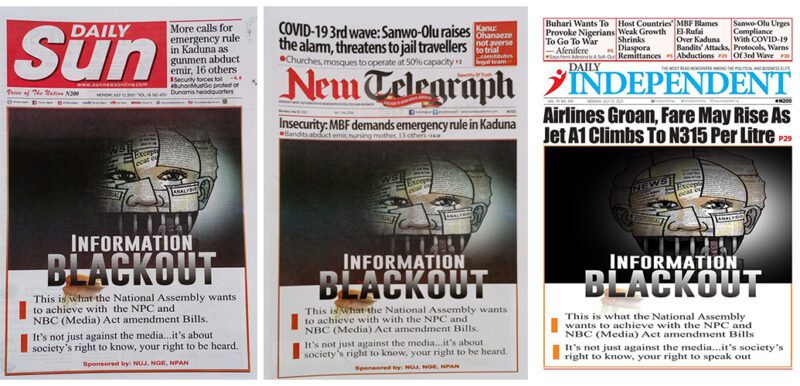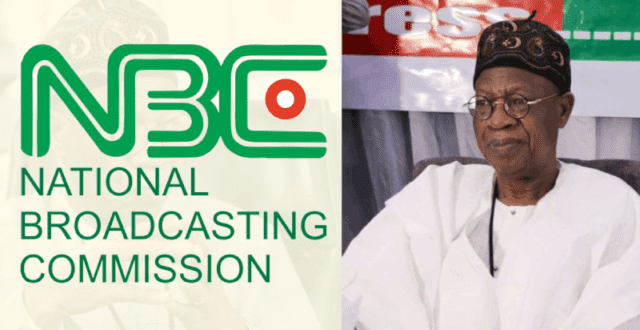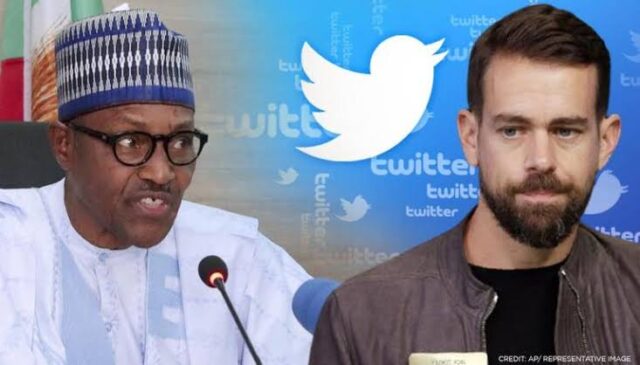Global Issues
Media Censorship: Standing In Solidarity With Journalists Should Be Everyone’s Business -By Isaac Asabor
The advertorial, which appeared on the front pages of dailies such as Punch, Vanguard, The Nation, ThisDay, Guardian, Daily Sun and Daily Independent among others was driven by a bold headline titled ‘Information Blackout’. The advertorial said the NPC and NBC (Media) Act amendment bills been considered by federal lawmakers was geared against the right of citizen’s information. The advertorial added that “It is not just against the media, “It is about society’s right to know, your right to be heard.”

“Let me say this. I will not be part of any bill that will seek to gag the press. I want to say it loud and clear, if that will be of any consolation. No bill will come to the floor of the House that seeks to gag the press because the press is supposed to be the voice of the people.
“However, I hold very strongly to the view that there is press freedom and there is freedom of expression. They had always been there and they will always be. On freedom of expression; I think it is important to listen to one another, understand each other, so we can make progress as a nation”.
The foregoing quotes were the words of the Speaker of the House of Representatives, Femi Gbajabiamila, who spoke at an award ceremony, themed: “Recognizing Good Governance and Legislative Excellence in the Face of Adversity”, on Monday, July 12, 2021 in Abuja. His words were unarguably hinged on the NPC and NBC (Media) Act amendment bills been sponsored by Segun Odebumi, and under the consideration of the federal lawmakers geared against the right of citizens information. Without doubt, the speaker who ostensibly took exception from the grey areas in the bill said he will never be part of any bill to gag the media in Nigeria but noted that there was a difference between regulating and gagging the media.

In as much as the advent of smartphones and social media have given the public the ability to capture and broadcast, it seems there has been a remarkable shift in who is now leading discussions on critical national issues as everybody can claim to be Journalist. Be that as it may, the traditional journalists are unarguably needed more than ever before as they have better skills and experiences toward the interpretations of information, and has the professional knack to ask “Who’s saying what? What is the context? Why is he saying it? What does it mean? Why is it important? Without doubt, a Journalists has the experience of asking probing questions to see the bigger issues and ask the bigger questions.
Given the synergy that now exists between traditional journalism and citizen journalism, there is no denying the fact that the time for Nigerians; irrespective of their professional inclinations, to stand in solidarity with traditional-cum professional Journalists has come. The reason for this call cannot be farfetched as the purpose and importance of journalism is unarguably to inform society with the news they need to live their lives as they daily update them with events and happenings that are needed to make decisions about different things. In fact, without journalism, the world would be ignorant. Journalism is important because it gives current and relevant information and news to the public. It is against the foregoing backdrop that Benjamin Franklin said, “Whoever would overthrow the liberty of a nation must begin by judging the freeness of speech.” In a similar vein”.
Most inspirational of all quotes to this writer about the importance of Journalism to the society is the one attributed to Hillary Clinton which says, “In almost every profession, whether it is law or journalism, finance or medicine or academia or running a small business, people rely on confidential communications to do their jobs. We count on the space of trust that confidentiality provides. When someone breaches that trust, we are all worse off for it. Analyzed from the perspective of the foregoing, it is little wonder that the Nigeria Union of Journalists (NUJ), the Nigerian Guild of Editors (NGE) and the Newspaper Proprietors’ Association of Nigeria (NPAN) jointly sponsored several newspapers in Nigeria on Monday, July 12, 2021, in the publishing of an advertorial against the media regulations bills that have being adjudged by not a few media experts to be draconian.

The advertorial, which appeared on the front pages of dailies such as Punch, Vanguard, The Nation, ThisDay, Guardian, Daily Sun and Daily Independent among others was driven by a bold headline titled ‘Information Blackout’. The advertorial said the NPC and NBC (Media) Act amendment bills been considered by federal lawmakers was geared against the right of citizen’s information. The advertorial added that “It is not just against the media, “It is about society’s right to know, your right to be heard.”
It is germane to say that if there is anytime the media need the support of the people, it is now. While the support of the people is been sought in this context, it is expedient to recall that over the years that the Nigerian media has been passing through the whims and caprices of government by each passing day, some of which tried to gag it, and in that vein deprived it of its freedom despite the liberty and independence granted it by section 39 (1) of the Federal Republic of Nigeria constitution.
For the sake of clarity, it is expedient to say that the law as enshrined in the 1999 Constitution guarantees freedom of expression as a fundamental right, even as it gives the citizens and Journalists the right to report upon, record, transmit or otherwise exploit any still or moving visual images, any audio material, any audio-visual material and any text data by any means whatsoever (whether now known or hereafter devised, developed or invented).
There is no denying the fact that the privileges and rights that are inherent in section 39 (1) of the constitution, and to a large extent in sub-section 2 of it, and which are available to Journalists are at the moment been threatened, particularly as they face the risk of being tinkered by a member of the House of Representatives, Rep. Olusegun Odebunmi (APC-Oyo) who has unarguably been pushing for speedy action on the Journalism Enhancement Bill before the National Assembly.
There is no denying the fact that the fear that has seemingly engulfed media practitioners and other Nigerians since the bill has been before the house, and thickening since the lawmaker began to push for the amendments that sought to change the NPO and NBC bills is literarily huge. The reason for the fear cannot be farfetched as Odebunmi has never gone to any journalism school or practiced as a media person, according to his profile gathered online.
Not only is Odebunmi’s expertise as far as the media profession is concern is being questioned in this context, the two anti-media bills are designed not only to intimidate and stifle the press, but also to bungle the philosophy behind Nigerian democracy as it will no doubt gag free speech. It is also been feared that the bill intends to insert obnoxious clauses in the Nigeria Press Council (NPC) and the National Broadcasting Commission (NBC) Acts.
Reiteratively put, as regard the looming media censorship, it is expedient to say that fighting against it is everyone’s business


















